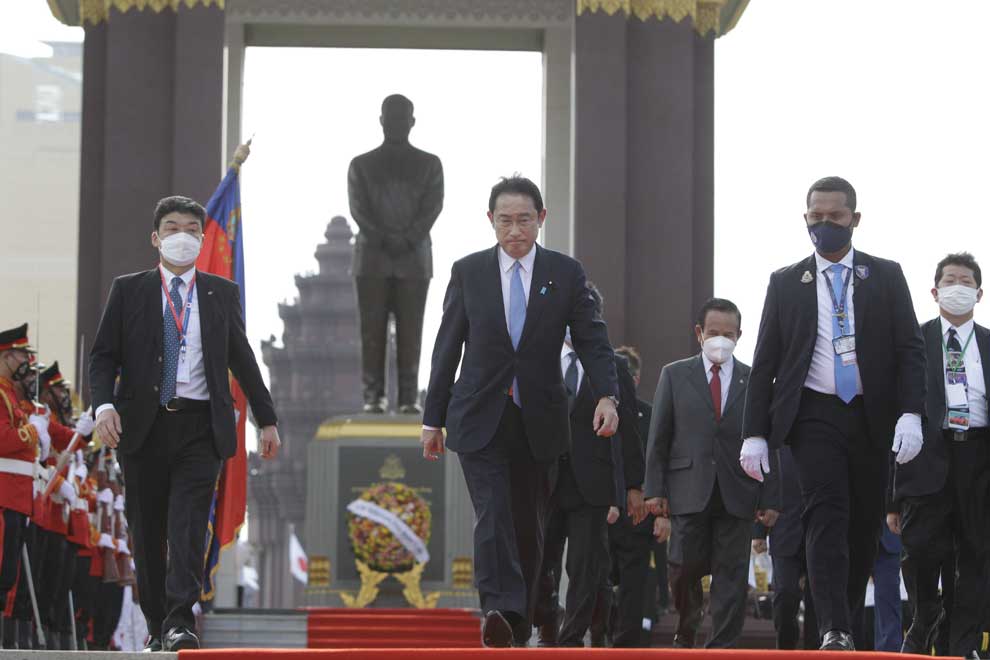
Japanese Prime Minister Fumio Kishida (centre) walks past an honour guard after laying a wreath at a statue of the late King Father Norodom Sihanouk in Phnom Penh on Sunday. Heng Chivoan
Japanese Prime Minister Fumio Kishida has arrived in Cambodia on a two-day visit to strengthen bilateral ties and discuss matters of economic and security cooperation, with the Ukraine and Myanmar crises slated to be on the agenda.
Before touching down in Phnom Penh, Kishida issued a statement saying that this will be his second visit to Cambodia – having first visited in 2014 as the Japanese foreign minister – and that he wished to see the country’s development.
“Cambodia has achieved strong economic development since it attained peace. I would like to take this opportunity to offer my respect to the Cambodian people again for their efforts taken so far [at achieving peace],” he said.
But he noted that, despite the relationship between the two countries “growing deeper in all sectors”, the crises happening “around the world around our countries were becoming more complex”, making reference to Russia’s military offensive in Ukraine and the ongoing Myanmar crisis.
Kishida said his visit to Cambodia has two goals: to strengthen bilateral ties and to improve regional and international relations, including the Ukraine and Myanmar issues.
Japan has been a longtime ally to Cambodia, providing support to the Kingdom particularly in the demining sector, where it has supplied demining tools and expert assistance. The country has also helped to facilitate the supply of clean water in Phnom Penh.
Most recently, Japan donated 1.3 million doses of the AstraZeneca Covid-19 vaccine to Cambodia and provided a loan of 45 billion yen (over $377 million) to aid Cambodia's Covid-19 fight.
The Japanese government will also support the development of Preah Sihanouk Autonomous Port, which has been identified as a pillar for the development of Cambodia.
“I strongly believe that our cooperation has increased the trust between the two governments,” Kishida said.
“Today … I will discuss in detail with Prime Minister Hun Sen the matter of economic and security cooperation to develop our bilateral relations, and how we can further improve it.”
The Japanese premier said the international community is facing a situation which is “shaking the foundation of the rules-based international order”.
“The Russian invasion of Ukraine is a clear violation of international law and is absolutely unacceptable,” he said, noting that both Japan and Cambodia had co-sponsored the UN resolution denouncing Russia’s military action.
He added that he had discussed the situation in Myanmar with Prime Minister Hun Sen, who told him that Cambodia is eager to “find a solution” to the conflict during its chairmanship of ASEAN.
“I am of the view that through the experiences of war, Cambodian people have special ideas about achieving peace, and I would like to cooperate with the Cambodian government to find ways to realise peace and stability in the region and in the world.
“2023 is the 70th anniversary of diplomatic relations between Japan and Cambodia. Let us turn a new page in Japan-Cambodia cooperation!” he said.
Heng Ratana, director-general of the Cambodian Mine Action Centre (CMAC), said Kishida’s visit to Cambodia has “immensely strengthened” Japan-Cambodia relations.
“The Japanese government is one of the biggest donors to the mine action sector in the Kingdom, in particular to CMAC, and has provided generous grant assistance,” he said, adding that the aid has extended to technical equipment such as demining machines, detection systems, demining toolboxes, demining logistics and financial support.
Ro Vannak, co-founder of the Cambodian Institute for Democracy, said Japan views Cambodia as an important strategic partner in the Southeast Asian region and has consistently tried to find political commonalities.
“Cambodia and Japan try to support and defend each other on their political agenda and on international issues,” he said, citing the example of both countries co-sponsoring the UN Resolution deploring Russia’s military offensive in Ukraine.
Vannak noted that Japan sees Cambodia as an important player in the Mekong River strategy, wherein all countries along the river play an important role in maritime geopolitical issues which challenge China’s presence in the region.
Japan also values Cambodia’s participation in the “Free and Open Indo-Pacific” concept it first introduced in 2016, and which has been backed by the US, Vannak said.
“With the ‘Free and Open Indo-Pacific’ concept, Japan sees ASEAN and member state Cambodia playing a role in supporting its strategic interest and influence in the region,” he said.











